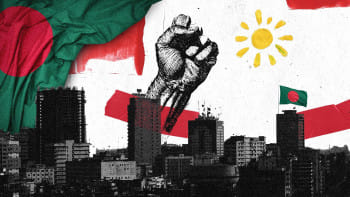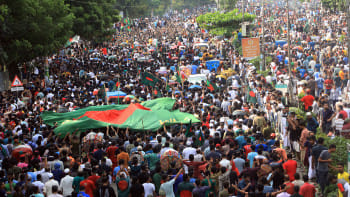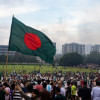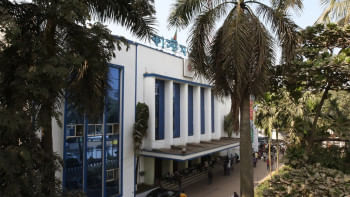The Bangladesh we want

Every Bangladeshi has a clear understanding of what went wrong in the past 15 years: blatant disregard for basic democratic values and principles, complete dissolution of systemic checks and balances through the decline of democratic institutions, unprecedented levels of kleptocracy leading to economic destabilisation, law enforcement agencies co-opted as ruling party apparatus, violation of human rights and, of course, unparalleled brutality.
Prior to 2009, though not perfect, Bangladeshis had been living with their own brand of democracy. Both major political parties and their coalitions had experienced being voted in and out, with the usual barrage of corruption, cronyism etc. in play during their times. In any case, pre-2009, our expectations from democracy were relatively low to begin with. So how did things get to these unprecedented depths?
The idea here is not so much to rehash the very obvious democratic and institutional failings as stated earlier, which certainly crafted a path for its demise, but to examine from an anthropological perspective, if one may, the deeper contributing factors to see what lessons we can draw from it. As we delve into some of these underlying factors that in effect, served as catalysts for a second independence movement, it appears as though Shiekh Hasina failed to understand the basic socioeconomic DNA of her own people.
The first factor taps into perhaps one of the most defining features of us Bangladeshis as a people—and that is the deep-rooted need for us to be able to express ourselves, our thoughts and our opinions. Freedom of expression is a right close to our hearts, deeply intertwined with the very essence of our identity. History also stands witness to the fact that the 1952 Language Movement led by students, the vehicle for our expression, was the first step towards the formation of Bangladeshi nationalism.
Over the past 15 years, through the enactment of repressive and draconian laws, the use of politicised state institutions and the violent ruling party student wing, extraordinary levels of brutal suppression were perpetrated by the government to curb any form of expression that was not single-minded praise of the prime minister and her regime. People have been indefinitely detained, tortured in custody, falsely accused of crimes just for sharing or liking a social media post. Had Sheikh Hasina been able to learn from history or comprehend the essence of her people (in modern terms we call this emotional intelligence), she may have been able to predict that this would only serve to fuel anger and nationalism in peoples' hearts until the moment it erupts, taking down everything in its path.
The second factor is the PM not really internalising the significance of the national youth demographics vis-a-vis creating a culture and personality cult around her father Shiekh Mujibur Rahman. Bangladesh has a youth bulge of over 28 percent which translates to almost 46 million people between the ages of 15 and 29. This under-30 population has never seen Mujib or been a part of the 1971 independence movement and, as such, does not share the same emotional connection the way the older generation does. Therefore, the "muktijuddher chetona," a concept leveraged by Hasina et al. to evoke and exploit emotions attached to the hard struggle that brought freedom, did not lend itself to the same extent of emotional manipulation of the younger generation. In fact, Bangladeshi youth saw more clearly than its elders did what exactly this "muktijuddher chetona" had devolved into over the past decade—an unspoken password to signal Awami League party allegiance. Anyone not subscribing to muktijuddher chetona was then a razakar or a potential anti-state element needing to be dealt with.
This segues to the third factor, which is Hasina effectively creating a party state. This is largely an aging political strategy whereby the only way to have access to better opportunities is if one is part of the ruling party. The ruling party, also known as the "winner," owns and is entitled to all social and economic perks and the only "easy" way to live a potentially better life is to join the party ranks. Once in, real perks only start to come in when you rise through the ranks; and to do so, the only currency that works in this system is loyalty and the demonstration thereof. Depending on the level, loyalty is demonstrated by carrying out, orchestrating or supervising all manners of nefarious activities that violate human rights, undermine democracy, further kleptocracy etc. Thus continues the vicious cycle: the more you demonstrate loyalty, the higher you rise, and the higher you rise, the more engaged you become in corruption. This eventually results in a society that is split between the haves and the have nots.
Another major factor towards growing frustration and anger amongst people has been Awami League's blatant and continued reuse of political tactics that usually have an expiry date—for obvious reasons—after being deployed a few times. The most notable of these has been the party machinery perpetuating some form of horrific violence themselves and then blaming the opposition or some other targeted rival groups for it. The AL has been known to use this repeatedly and for multiple purposes, such as to divert attention from itself on some issue or other, to evade accountability or most commonly to try and generate an excuse to persecute the opposition. Volumes can be written on it. The loss of lives, waste of national resources and the ensuing violence notwithstanding, the hubris and the condescension demonstrated in assuming that a whole nation of people are completely devoid of being able to read such obvious ploy is inexcusable.
Lastly and possibly the single most deciding factor leading to this mass uprising has been the continued use by the AL leadership of its student wing—the Chhatra and Jubo leagues—as ruthless tools for oppression and suppression. Given immeasurable powers and zero accountability, the student wing was instructed to keep the general grassroots society "in line." The merciless brutality that these groups have perpetuated on the people of Bangladesh over the past decade and a half will not be forgotten from our collective minds anytime soon. Murder, torture, extortion, scams, kidnapping, communal violence—Chhatra and Jubo leagues have openly done it all and never been called to order by its parent party. Given such actions, it was really fate accompli that the people would eventually push back once the proverbial last straw broke the camel's back.
Moving forward, as we grab with relief a chance to rebuild our nation, we must learn from this and take corrective actions to ensure we never ever find ourselves, as a nation, in a remotely similar place again. Starting with the reversal of the draconian laws, we will need to ringfence our freedom of expression and other basic rights in such a way that it cannot be dismantled so easily by any ruling regime.
Almost 53 years on, it is time that we let go of this cult culture around our independence movement, this obsession towards slotting people either as freedom fighters or "razakars" and the weaponisation of "muktijuddher chetona." Let us pay due respect to our history and to those who gave us the gift of independence and focus on restoring our society.
Also moving forward, we can't have any more party states. Guardrails within institutional processes will need to be put in place such that every appointment in the civil service and other state services must be merit-based with rigorous due process followed. All appointed government officials will need to declare (similar to declaration of assets) if they or their immediate relation is a registered member of any political party.
And finally, political party reforms will need to be proposed to abolish the political party affiliated student wings. Our apolitical student movement has shown us that we do not need political student wings to bring about political change. Over the years, political party student wings have only served to politicise education institutions and be instrumentalised by parent parties as necessary.
Like a phoenix, as we rise from the ashes of our past selves, it is important that we take some time for collective introspection to chart a strategic way forward.
Mir Nadia Nivin is an international governance and institutional reform specialist having served previously with the UN in many countries around the world helping strengthen governance and implementing reforms. She can be reached at [email protected]
Views expressed in this article are the author's own.
Follow The Daily Star Opinion on Facebook for the latest opinions, commentaries and analyses by experts and professionals. To contribute your article or letter to The Daily Star Opinion, see our guidelines for submission.

 For all latest news, follow The Daily Star's Google News channel.
For all latest news, follow The Daily Star's Google News channel. 









Comments